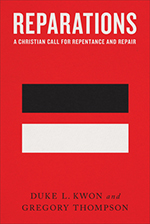Reviewed by Heather Hedlund
 Reparations. What emotions does that word conjure up for you?
Reparations. What emotions does that word conjure up for you?
Reparations is a word that can easily be a conversation ender or an argument starter. We usually think of it in terms of a large national, political project that seems doomed to never find consensus. This book looks at the idea of reparations from a very different perspective – a Christian perspective. Kwon and Thompson leave the political debate to others and instead ask the question, what is the responsibility of the Christian church in America to respond to the harms caused by centuries of racial injustice in this country.
The authors delve into the root causes of the injustices that have occurred and are still occurring. They help us understand the effects of racism through the lens of the root cause of White supremacy. That's another phrase that can shut a conversation down, but I encourage you to persist through any discomfort you feel and seek to understand how and why they use the term.
A primary theme of the book is "seeing." Just as Jesus uses the metaphor of blindness and sight frequently in his ministry, the authors help us to find our blind spots and notice what we haven't been seeing. For example, they point out that "the segregated structures of American life function as a sort of cataract to true sight" (p.45).
After helping us understand the scope of the repair that is needed, Kwon and Thompson make the case for the church's responsibility to respond. They look at the mission of the church; church history, both the good and the bad, both recent and ancient; and the biblical imperatives for restitution and restoration. In the final chapter, they provide guidelines and examples for bringing repair and restoration and encourage us to keep our focus on our own local communities.
Can you share a quote from the book that was meaningful to you?
"The true imperative of reparations is not simply for a debt to be repaid but for an entire world to be repaired" (p. 21). While financial resources are an important piece of the puzzle, they alone will not repair the damage that racial injustice has created. The authors challenge us to think more holistically about how to bring restoration to people and places who have been harmed by racial injustice and White supremacy.
What was a new thought or a key takeaway?
In the past, I've mainly thought of reparations at a large scale. Seeking a big national solution seems impossible. In this book, the authors make the case that "reparative work is fundamentally local, that reparations ought to privilege the ideas and agency of local communities" (p. 185). Honestly, this idea is a relief. It brings the problem down to a scale that still feels daunting, but with the help of the Holy Spirit also feels attainable for me as an individual Christian and for our church community.
What action will you take as a result of reading this book?
I've already taken some personal actions to invest some of our family's financial resources in organizations that are already doing the work of restoration well. My challenge now is to shift my focus from thinking about reparations on a national scale to a local scale. I will need to learn more about the history of our community, the organizations in our area that are addressing the damage caused by racial injustice in our community, and where I can invest my time and resources to help bring repair and restoration.
